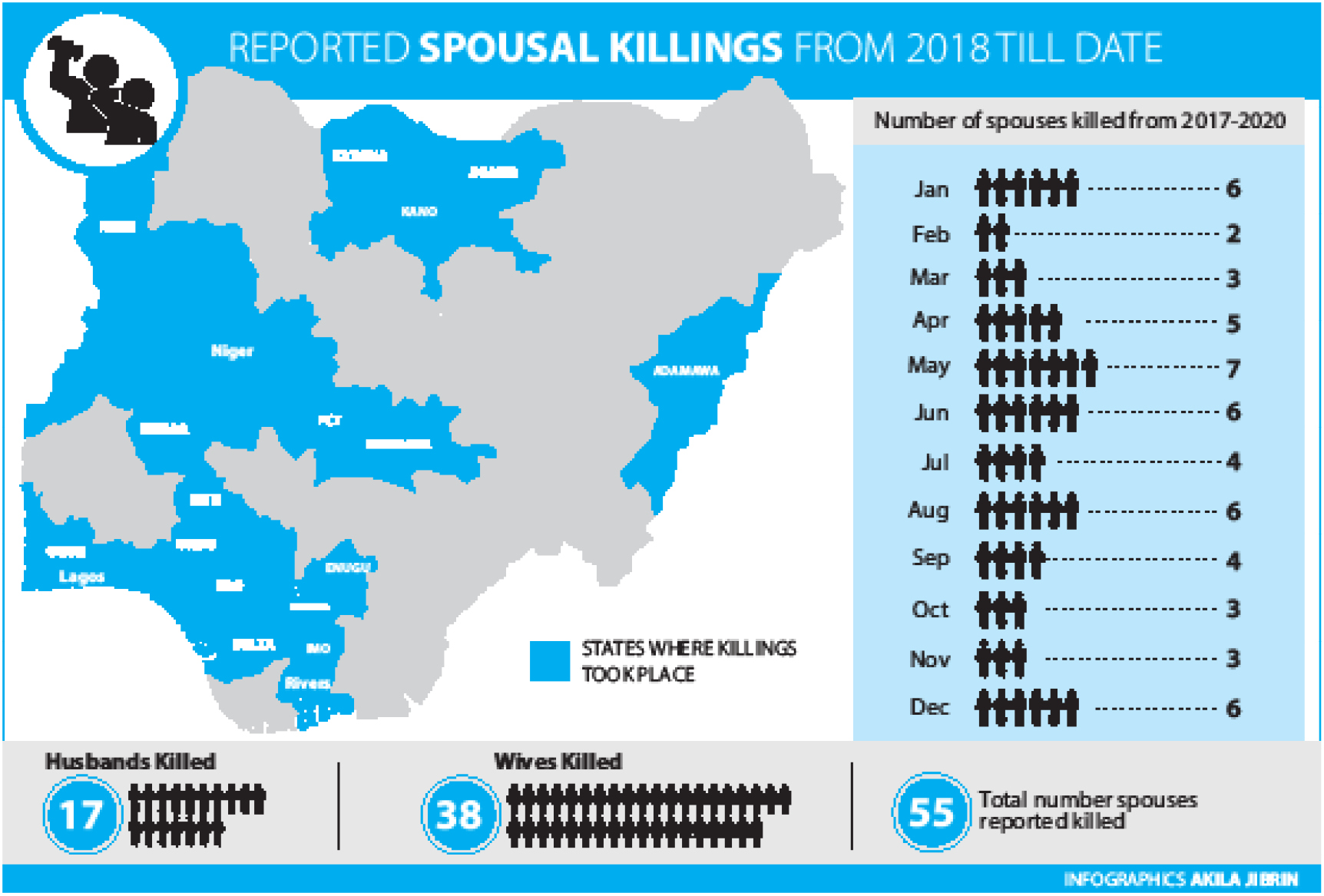The conclusion of the 26 month-long trial of Maryam Sanda, who was sentenced to death for killing her husband in November 2017, has unearthed old wounds of spousal killings in Nigeria.
The killing of spouses has been on the rise in Nigeria. From November 18, 2017 when Maryam stabbed her husband, Bilyaminu Bello, to death, to January 27, 2020 when she was found guilty and sentenced to death by hanging, there had been at least 57 other reported cases of spousal killings across Nigeria.
While Justice Yusuf Halilu of the FCT High Court in Maitama, Abuja was preparing for the judgment in Sanda’s case on Monday, the police in Katsina received a fresh report of another alleged spousal killing in Malumfashi Local Government Area of the state.
This time, 19-year-old Rabi Shamsudden, a housewife in Danjanku Tasha village of Malumfashi LGA, was the one in the eye of the storm following her arrest by the police for allegedly killing her 25-year-old husband, Salisu Shamsudden, with a knife.
The spokesman of the police in Katsina, Gambo Isah, said the incident happened around 4 am on Monday but that investigation was ongoing. While no reason has yet been put forward for the act, the police said neighbours of Rabi and Shamsudden heard the deceased shouting and calling for help and upon reaching the house, found the front door locked and decided to climb over the wall.
“Some people went over the wall into the residence and met the deceased crawling out of his room with a knife wound in his stomach,” the police spokesman said.
Other killings since Bilyaminu’s case
Data analysed by Daily Trust Saturday revealed that between the time of the killing of Bilyaminu and that of Shamsudden, November 18, 2017, to January 27, 2020, 16 other husbands have been reportedly killed by their wives, while as many as 39 wives have been killed by their husbands.
A state-by-state analysis of this data revealed that Abia, Adamawa, Anambra, Delta, Enugu, Imo, Kebbi, Kwara, Nasarawa and the FCT have each recorded one such killing within the period.
Lagos State has the highest of such reported cases at 12 while Anambra, Katsina and Ogun recorded five each while Niger has six reported cases. Kano has four and Rivers has three while Edo, Ekiti, Jigawa and Ondo states have two reported cases of spousal killings each within the period.
Reasons for spousal killings
While many have always identified infidelity as a major reason for the killing, domestic violence, which could have been caused by infidelity as well as several other reasons were identified as the recurrent reason for these killings with at least 19 of the documented cases being the reason for spouses killing their partners from 2018 till date. Other reasons as trivial as the refusal to breastfeed, refusal to cook Christmas food and refusal to do laundry, disrespect, mental illness and refusal to have sex have been put forward as reasons for killing spouses.
For instance, on May 17, 2019, one Baba Musa of Kusogi in Kwara State was arrested by the police for killing his wife, Hauwa, with a machete. His reason was that he had a dream that he was going to die and in order not to leave her behind, he decided to kill her in cold blood.
On August 26, 2019, it was also reported that a housewife in Bagudo Local Government Area of Kebbi State was arrested for allegedly killing her new husband so that she could go back to her former husband.
The police said the housewife, whose name was given as Auta Dogo Singe, conspired with one Garba Hassan and Sahabi Garba at Sabon Gari village, Illo district area of Bagudo to kill her husband, Abdullahi Shaho, to remarry her former husband.
Disagreement over money has also been put forward as a reason for spousal killing as in the case of Ojo Daniyan of Akure, Ondo State, who on September 14, 2019, set his wife ablaze over proceeds from a land sale.
Dausiyya Abdulmumin was only 15 years old on December 17, 2017 when she allegedly killed her 27-year-old husband, Saminu Usman. The husband’s crime, according to her, was that he had become unattractive to her. Usman had an accident, lost his teeth and started limping not long after they got married.
From the data analysed, it was observed that ego on the part of a male suspect was also responsible for the killing of his wife. Shina Kasali of Agbado Ifo in Ogun State was arrested on December 1, 2018 for allegedly killing his wife, Sofiat. He had reportedly confessed that he killed his wife because the woman was disrespecting him after he lost his job.
The case of infidelity
Like Maryam Sanda, many domestic issues have been an offshoot of either outright infidelity or suspicion of infidelity.
Daily Trust Saturday recalls that during her evidence during trial, Maryam had told the court that the fight that led to the death of her husband started when she used his phone to make a call and discovered a nude picture of a lady.
She stated that in the course of the discussion which degenerated into an argument, she asked her husband to divorce her, adding that the late Bilyaminu held her neck, choking her.
“He pushed me and as I was falling, I mistakenly broke his Shisha bottle and the water inside spilled on the floor. He pinned me to the ground as I heard our daughter crying, I told him to leave me so that I could attend to her and he loosened up a bit and I struggled to my feet,” she said.
She stated that while trying to hold her, the deceased fell down and she saw her husband holding his chest and saw a broken bottle in his chest which she removed and covered the chest with her scarf.
Although, the last aspect of her testimony (Shisha bottle) was rebuffed by the court for being a cover-up and narrative for the murder, her evidence of the fight starting after seeing a nude picture of another woman on late Bilyaminu’s phone was left uncontroverted.
While there was no autopsy report to determine what killed the deceased, the judge had held that not in all cases of culpable homicide the prosecution expected to produce an autopsy, especially where it was instant death.

Similar case, same outcome
A popular case which has similar circumstances to that of Maryam Sanda’s happened in 2016. Both cases were handed the death penalty. Also, both cases have two children each and pleas by the defendants’ lawyers played up the sympathy card on the need for justice to be tempered with mercy for the sake of the children.
Fifty-one-year-old Lekan Shonde, a depot worker in Apapa, Lagos State, was accused of killing his wife, Ronke, in their Lagos home, though he consistently denied committing the crime, stating that he only slapped her. He was said to have beaten his 37-year-old wife to death on Friday, May 5, 2016, at their residence in Lagos.
Passing judgement, the Lagos State High Court on Friday, March 8, 2109 sentenced Lekan Shonde to death by hanging for killing his wife. Justice Josephine Oyefeso while delivering the judgement sentenced Lekan to death based on the conviction that he killed his wife.
Justice Josephine Oyefeso held that the death penalty meted on the convict was based on Section 223 of the Criminal Law of Lagos State, 2015. The judge added that the defendant was very economical with the truth. She stated that his evidence before the court that he had only slapped his wife when he overheard her on a phone call praising the sexual prowess of a lover, did not match the autopsy report by the pathologist, Dr Shokunle Shoyemi, which revealed old and fresh injuries on the deceased.
She held that the bruises on the deceased’s cheek, blood collection in the brain, brain swelling and other multiple injuries could not have been self-inflicted.
Justice Oyefeso said, “This is the sentence of the court upon you, that you should be hanged until you are dead. May the Lord have mercy upon you.”
However, the defence counsel pleaded with the judge to temper justice with mercy. He pleaded thus, “The couple has two kids, I know that these two children have passed through the worst moments of their lives. I know if these two children had any control in this proceeding, it would be that their father should not be prosecuted at all, but since they could not have that, their wish is that their father should be sentenced on a very liberal term.
“The defendant has no criminal record, he has developed a series of failing health conditions since his detention. This defendant hardly sees very well again, he sees faintly. My Lord, he is hypertensive.”
Similar case, different outcome
An Ibadan-based lawyer, Yewande Oyediran, was on November 28, 2017, sentenced to a seven-year jail term for killing her husband, Lowo, a France-based businessman, during a domestic scuffle. She reportedly stabbed him to death with a knife on February 2, 2016, at their No. 30, Adeniyi Layout, Abidi-Odan, Akobo area of Ibadan.
Justice Muktar Abimbola, while pronouncing the judgment in Yewande’s trial, said he took into recognition the fact that the evidence and facts of the case presented to him did not point to the fact that the act was premeditated.
He averred that even though the incident was that of anger predicated on the call of another woman who was the mother of the love child of the deceased, it was not pre-medicated, even though the prosecution proved that the defendant caused the death of her husband.
A week before the expiration of his tenure in May, 2019, the then Governor of Oyo State, Abiola Ajimobi, pardoned Yewande.
While Maryam Sanda, who got death by hanging on Monday, never admitted to the crime, the court had held that by the Doctrine of Last Seen, she was under the obligation to explain how her husband died.
Her defence that the deceased died from injuries he sustained after falling on pieces of a broken Shisha bottle was rebuffed by the court, with the judge, Justice Yusuf Halilu, describing it as a cover-up for the crime. He held that two of the prosecution witnesses gave evidence that the Shisha bottle was seen intact moments after the crime, adding that the evidence from these witnesses was not contradicted.
The judge had also held that Maryam, in her statement to the police, had written during her fight with her late husband that she told him (Ibrahim, a friend of deceased), “My husband has to divorce me or I cut his private part. I now brought out the kitchen knife and I told him he either divorces me or I cut off his private part.”
“I am more than convinced that the defendant fatally stabbed the deceased with the same knife she threatened him with, which she has also mentioned in her statement to the police with the full the knowledge that death was not just probable but certain,” Justice Halilu had held.
Appeal in progress – Maryam lawyers
Lawyers in the law firm of Ricky Tarfa and co, who defended Maryam at the High Court, said the firm had already applied for and gotten the judgment. This, they said, was a pre-cursor to the process of filing an appeal at the Court of Appeal.
The lawyers, who asked for anonymity because they were not authorised to speak to the media, said the firm got the judgment late Thursday and that the firm would soon do the needful.
They said the mood was sombre in the office after the judgment of Monday but that they had confidence in getting an acquittal at the appellate court.
Bilyaminu family speaks
Abba Bello Halliru, a brother to Bilyaminu, said the family was not involved in the court case as they had long forgiven her.
In an interview with the Voice of America (Hausa service) monitored by one of our reporters, Halliru said, “Government was responsible for dragging Maryam to court, it’s destiny that has befallen her, it’s pathetic.
“Honestly, I can view this judgment as one that came from the Almighty. As since the demise of our brother, Bilyaminu, a lot of things have been said concerning the circumstances that surround his death. We’ve left everything to the hands of Allah and whatever that happened was His will and destiny from Him.”
He added: “Since there are children between them (Bilyaminu and Maryam), a relationship has already been established. What we hope is how these children should know/recognize their paternal and maternal relatives. What we are looking for are these two children. We are not against or nurture any ill will against anybody … we pray that may Allah forgive and give our dead brother his rights that were infringed.”

 Join Daily Trust WhatsApp Community For Quick Access To News and Happenings Around You.
Join Daily Trust WhatsApp Community For Quick Access To News and Happenings Around You.


